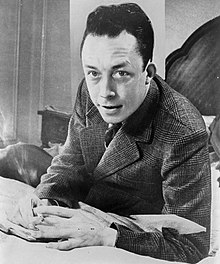
Back Albert Camus Afrikaans Albert Camus ALS አልቤር ካሚው Amharic Albert Camus AN ألبير كامو Arabic البير كامو ARZ Albert Camus AST Albert Camus AVK Albert Camus Aymara Alber Kamü Azerbaijani
Albert Camus | |
|---|---|
 Portrait from New York World-Telegram and Sun Photograph Collection, 1957 | |
| Born | 7 November 1913 |
| Died | 4 January 1960 (aged 46) Villeblevin, France |
| Alma mater | University of Algiers |
| Notable work | The Stranger / The Outsider The Myth of Sisyphus The Rebel The Plague |
| Spouses |
|
| Awards | Nobel Prize in Literature (1957) |
| Region | Western philosophy |
| School | |
Main interests | Ethics, human nature, justice, politics, philosophy of suicide |
Notable ideas | Absurdism |
| Signature | |
Albert Camus (/kæmˈuː/[2] kam-OO; French: [albɛʁ kamy] ⓘ; 7 November 1913 – 4 January 1960) was a French philosopher, author, dramatist, journalist, world federalist,[3] and political activist. He was the recipient of the 1957 Nobel Prize in Literature at the age of 44, the second-youngest recipient in history. His works include The Stranger, The Plague, The Myth of Sisyphus, The Fall, and The Rebel.
Camus was born in Algeria during the French colonization, to pied-noir parents. He spent his childhood in a poor neighbourhood and later studied philosophy at the University of Algiers. He was in Paris when the Germans invaded France during World War II in 1940. Camus tried to flee but finally joined the French Resistance where he served as editor-in-chief at Combat, an outlawed newspaper. After the war, he was a celebrity figure and gave many lectures around the world. He married twice but had many extramarital affairs. Camus was politically active; he was part of the left that opposed Joseph Stalin and the Soviet Union because of their totalitarianism. Camus was a moralist and leaned towards anarcho-syndicalism. He was part of many organisations seeking European integration. During the Algerian War (1954–1962), he kept a neutral stance, advocating a multicultural and pluralistic Algeria, a position that was rejected by most parties.
Philosophically, Camus' views contributed to the rise of the philosophy known as absurdism. Some consider Camus' work to show him to be an existentialist, even though he himself firmly rejected the term throughout his lifetime.
- ^ Schrift, Alan D. (2010). "French Nietzscheanism" (PDF). In Schrift, Alan D. (ed.). Poststructuralism and Critical Theory's Second Generation. The History of Continental Philosophy. Vol. 6. Durham, UK: Acumen. pp. 19–46. ISBN 978-1-84465-216-7.
- ^ "Camus". Random House Webster's Unabridged Dictionary.
- ^ Leinen, Jo; Bummel, Andreas. "A Democratic World Parliament" (PDF). democracywithoutborders.com. pp. 1, 2. Retrieved 12 January 2024.
© MMXXIII Rich X Search. We shall prevail. All rights reserved. Rich X Search